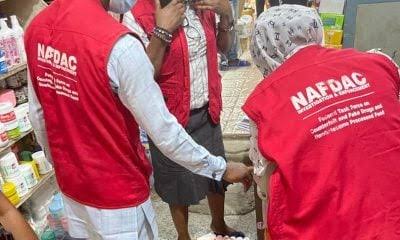According to the National Agency for Food and Drug Administration and Control (NAFDAC), recent enforcement raids targeting illegal drug sales in three major cities—Lagos, Onitsha, and Aba—generated N2.5 billion in fines.
During her appearance before the House of Representatives Committee on Food and Drug Administration and Control on Wednesday, the agency’s director-general, Prof. Mojisola Adeyeye, revealed this information.
According to her, the sum was obtained as fines from merchants who were found to be offering shoddy and fake pharmaceuticals in public marketplaces around the nation.
All of the money was transferred to NAFDAC’s legitimate account, she explained.
N159 million had to be borrowed from a donor-funded grant to support the endeavor, while N996 million of the N2.537 billion earned was utilized to carry out the enforcement actions.
The agency had a balance of about N206 million after regulatory expenses totaled an additional N1.175 billion.
Over 1,300 security personnel were deployed for the operation, which revealed a wide range of infractions, including the selling of expired medications, unregistered medications, and improper storage procedures, Prof. Adeyeye added.
According to her, “the charges were paid directly into NAFDAC’s account.” “We invested around N1 billion in activities in Aba, Onitsha, and Lagos. We had to borrow N159 million from a donor grant since we didn’t have enough money.
Only over N207 million was left over after N1.175 billion was spent on regulatory actions.
She mentioned that certain vendors were discovered to be dealing in dangerous substances and banned medications like tramadol.
Read Also: NNPC Confirms Completion Plan for Port Harcourt Refinery Rehabilitation
She emphasized that the fines were required to enforce standards and were not punitive.
In many instances, the default penalty of N2 million for breaking Good Distribution and Storage Practices (GDSP) was reduced to N500,000 in order to promote compliance.
Adeyeye bemoaned how the Federal Government’s revenue restrictions had seriously weakened the agency’s ability to continue comparable enforcement activities.
She clarified that even though NAFDAC had N19 billion in its account at the end of 2023, only N4.5 billion was ultimately released because N9 billion had been taken out before the agency could access it.
Adeyeye, who spoke on NAFDAC’s 2024 operation in Kano, said it was a special court-ordered intervention that was very different from the enforcement activities in southern cities.
According to her, the raid came after a Federal High Court ruling on February 16, 2024, which ordered open drug market vendors to relocate to the recently constructed Kanawa Pharmaceutical Centre, a Coordinated Wholesale Centre (CWC).
The traders fought back. Violence was threatened. We retaliated by using heavier padlocks to secure their stores after they locked them, she claimed.
“They had to agree to move to the regulated CWC before they could reopen.”
Because of the court mandate and the unstable security situation, no fines or administrative charges were collected in Kano, in contrast to the southern operations.
After the dealers moved, post-marketing surveillance was carried out.
She noted that around the beginning of January 2024, “our accounts had just been frozen and reopened with a zero balance.”
“We had to relocate over 1,300 stores to the regulated facility in accordance with the court’s order, despite the financial strain.”
She praised the Kano State administration for creating the CWC, pointing out that, even before she took office, it was the sole state following the presidential order.
On the other hand, because Lagos, Onitsha, and Aba lacked CWCs, NAFDAC was forced to examine and punish violators.
“The agency acted based on the urgency of the court ruling and the risk to personnel,” Adeyeye said in response to lawmakers’ worries over the alleged preferential treatment of Kano dealers.
“In hindsight, more inspections or charges might have been ideal,” she said. However, things were too tense; one of our legal professionals was almost attacked.
Safety and adherence to the court order had to come first.
The Office of the Accountant-General of the Federation (OAGF) has reclassified NAFDAC as a revenue-generating agency, enabling it to automatically take a sizable percentage of the agency’s earnings, according to a briefing given to the committee by Adeniji Nma, Director of Finance and Accounts for NAFDAC.
Since 2024, half of all payments made to NAFDAC have been withheld and sent to the federal government, per an order from the OAGF, she stated.
This deduction rose to 75 percent by 2025. Since the majority of our payments are service-based and directly related to inspections and other activities, this makes it very difficult for us to finance our operations.
After the presentation, committee member Hon. Emeka Idu requested a thorough, site-by-site analysis of the money obtained from the enforcement operations.
Hon. Regina Akume, the chairperson of the committee, deemed the presentation lacking and instructed the agency to submit a comprehensive report detailing all income received and distributed, including precise numbers from every location.
“A complete picture of the inflows and expenditures is still lacking,” she stated. “You must return, organize your files, and provide a thorough breakdown.”

